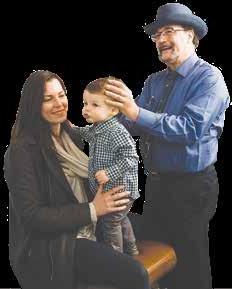
13 minute read
Contents
Healing the Immune System Autoimmune Breakthroughs Offer New Hope
by April Thompson S ome 23 million Americans suffer from one or more autoimmune diseases—a category comprised of more than 80 conditions, including fibromyalgia, Hashimoto’s disease, psoriasis, rheumatoid arthritis and Type 1 diabetes. These pernicious disorders are notoriously difficult to diagnose, even harder to treat and can be debilitating, diminishing the quality of life for sufferers.
Another commonality is the increased prevalence of autoimmune disease in women versus men; in the case of lupus, for example, a nine-fold difference. Some early indicators are that this may be related to a “gene dosage effect”, as men with XXY chromosomes have the same risk of developing lupus as other women, and women with XXX chromosomes (known in medical parlance as “superwomen”) have an even higher risk of autoimmune disease, according to Judith James, chair of the Arthritis & Clinical Immunology Program at the Oklahoma Medical Research Foundation, in Oklahoma City.
Yet there is hope on the horizon, as scientific discoveries unlock important insights about the manifestation and progression of autoimmune diseases leading to new treatments and prevention tips. Evidence is also mounting around the role of diet and lifestyle in autoimmune conditions, giving patients new avenues for taking charge of their health instead of simply waiting for a cure.
Autoimmune diseases are chronic and can affect almost any part of the body, including the heart, brain, muscles, skin, eyes, joints, lungs, kidneys, glands, digestive tract and blood vessels. Each disease carries its own set of symptoms, but inflammation is nearly always present, and are all connected by how the immune system attacks the body’s healthy tissues. “Those shared characteristics hold the potential for shared treatments, and ultimately potentially common cures,” says Jane Buckner, president of the Benaroya Research Institute (BRI), at Virginia Mason, in Seattle, which works to advance the prediction, prevention, reversal and cure of immune system diseases.
“I’m excited about our progress toward prevention. We are working to understand

those tipping points in transitioning into disease that help us understand who is at highest risk, and helps give very directed therapies,” says James.
Self-Healing from Autoimmunity
By her early 20s, Mickey Trescott, of Willamette Valley, Oregon, was bedridden and had lost her job to autoimmune disease. At one point, doctors thought it was multiple sclerosis (MS); she was dizzy, numb, falling over and slurring her speech. Eventually, she was diagnosed with both Hashimoto’s and celiac diseases, affecting the thyroid and small intestine, respectively. Trescott, a nutritionist, chef and author of The Autoimmune Paleo Cookbook, had been vegan for 10 years, but had a feeling that her body needed something different.
She found an early version of what would become known as the autoimmune protocol (AIP), and in following its guidelines, began to find relief. Trescott connected with other women and started a private Facebook group to share information on what was improving their condition from which the AIP community sprung. AIP, an elimination diet that seeks to reset the immune system by cutting out inflammation-causing foods and treating leaky gut, has much in common with the paleo diet and promotes vitamin- and nutrient-rich foods. However, every individual comes out of the AIP process with a customized diet.
For Trescott, “Gluten is a forever-no, and I am also allergic to dairy and sensitive to a lot of nightshade vegetables, like tomatoes and peppers.” It took three years to recover most of her functioning, and although she had been a personal chef, it was still challenging to determine a new approach to eating that didn’t include the grains and legumes that had been staples of her diet.
Trescott is still on medications, including the same thyroid support she’s relied on from the start. “There is a misconception that the AIP is an alternative to conventional medicine. We really pride ourselves on using all the tools in our toolbox, including surgery, medication and lifestyle changes,” she says.
Anecdotal successes like Trescott’s have led researchers to pursue funding to test the AIP’s efficacy. In a pilot study of 18 individuals with an average sick time of 19 years that didn’t respond to traditional medication, 73 percent were in clinical remission at the end of the trial, having followed the AIP. “It was a small sample size, but the results are promising,” says Trescott.
Physician, Healed Thyself
Like many physicians, Terry Wahls focused on treating her patients with drugs or surgical procedures—until the Iowa City doctor was diagnosed with MS in 2000. Within three years, despite conventional medical treatments, her back and stomach muscles had weakened to the point where she needed a tilt-recline wheelchair, and by the summer of 2007, she could no longer sit up.
Though Wahls had been a vegetarian on a low-fat diet for 20 years, she went back to eating meat and gave up all dairy, wheat and grains, but still wasn’t improving. Delving back into the science of her condition, Wahls realized that mitochondrial support was key, and the speed of her decline slowed while taking a cocktail of vitamins to support its functioning.
It wasn’t until she took a comprehensive approach to optimize everything she could take in through her food rather than relying on supplements that she saw radical results: Her brain fog, fatigue and pain went away and she biked around the block for the first time in six years. “Taking in nutrients in the form of food rather than supplements, you get related compounds and thousands of others in biologically anticipated ratios,” explains Wahls. “I still do take some supplements, but the magic is the food.”
Those key ingredients, says Wahls, include magnesium, zinc, selenium, sulfur, amino acids, cholesterol, omega-6 and omega-3s, fats, carnitine and creatine. Her rule of thumb for daily intake is three cups of leafy green vegetables; three cups of sulfuric vegetables like cabbage, mushrooms and onions; and three cups of deeply pigmented vegetables, plus sources of protein for meat eaters and vegetarians.
While her work was initially not accepted, today she has funding from the National MS Society and her research has
De-stress. Relax. Reduce Pain. Enhance Your Health with Foot Reflexology $20 discount for your first session!
DENISE HELD, RN Certified Foot
Reflexologist & Reflexolo-Chi TM
“It’s incredible how much better I feel.” (N.S., Ann Arbor)
– drkabisch.com –
Thomas F Kabisch, DO, MDh
Awoon PLLC • Metro Ann Arbor • 734-971-5483 2350 E Stadium Blvd Suite 12
INTEGRATED GENERAL MEDICINE for the whole family.
46 years experience with guarantees –don’t waste money.
n Homeopathy n Herbology n Nutriceuticals n Pharmaceuticals n Neuropsychology n Manual & Energetic
Medicines n Stem Cell Therapy n Complementary Cancer & Intravenous Therapy n Addiction Therapy n Age Management n ‘Simple Life’ Cancer
Prevention Program
Certified Health Education Courses See curriculum online, visit drkabisch.com now.


been published in numerous peer-reviewed journals. “Basic science is now showing that the microbiome has a huge impact on the immune system activity and the brain; the food we eat can turn gene expression on and off,” says Wahls, who hasn’t taken any drugs for her autoimmune condition since 2008.
Buckner cautions against patients trying to manage disease with lifestyle changes alone, without giving available allopathic treatments a fair try. “People do better if they are treated early and aggressively. They are reliant on fewer medications down the road and don’t have permanent damage if they seek treatment early.”
However, even researchers focused on pharmaceutical approaches acknowledge the importance of diet and lifestyle. Meggan Mackay, professor of Molecular Medicine at the Feinstein Institutes for Medical Research, at Northwell Health, in Manhasset, New York, believes this can play a critical role in disease management. She cites numerous studies showing exercise as a stress-buster positively influencing disease outcomes, as well as a more specific study looking at the benefits of adding fish oil and vitamin D to the diets of lupus patients. “The rise in obesity, which is linked to increased inflammation in the U.S., may be one of reasons we are seeing more autoimmune disease than ever,” says Mackay.
At-risk individuals should be aware of factors under their control, adds James. “If someone is worried about autoimmune disease running in their family, monitoring and maintaining adequate vitamin D levels and avoiding smoking and other high-risk behaviors can help improve their chances.” Even sleep patterns can play a role in disease manifestation, says the researcher. In one study, individuals at high risk for autoimmune disease that slept less than seven hours per day were more likely to develop an autoimmune condition, according to James.
Common Links Serve as Research Clues
There are some clear links between autoimmune diseases, such as the genetic predisposition that runs in families. “Someone with rheumatoid arthritis may have a sister with celiac disease, for example, and one individual may suffer from multiple autoimmune conditions. We can learn from these common genetic links,” says Buckner. These common links can serve as important clues. For example, Buckner says they are able to demonstrate changes in T cells in diabetes and MS that are the same, which might lead to common treatments for the two conditions.
While the process from basic scientific discovery to development of effective treatment can be slow, there are some concrete breakthroughs autoimmune researchers are excited about, having demonstrated ability to both prevent and delay disease. Citing a recent clinical trial published in the New England Journal of Medicine, “They have demonstrated in kids at high risk for developing Type 1 diabetes the ability to delay onset for at least two years. It’s an incredibly exciting finding,” says Buckner.
Mackay is hopeful about advances in basic science addressing specific immune system abnormalities linked to inflammatory problems. “Lupus is very challenging to diagnose and treat because it can affect every system in the body,” says Mackay, whose research team has focused on lupus for decades. “The only forms of treatment have been very immune-suppressive medications that shut down the immune response. None of these medications are specific, so in shutting down the immune response to treat lupus, they in turn interfere with the body’s ability to fight off infection and cancer.” Researchers are now honing in on single cells from biopsies that indicate which proteins are abnormal, thereby helping develop more selective therapies, she says.
Seeing progress in the lab is one thing; seeing it in the waiting room is another, and that’s where autoimmune scientists and clinicians are really beginning to note a difference. “I’ve seen patients for 25 years, and when we started, we had very few options in my clinic, which was full of wheelchairs,” says Buckner. “In the last 20 years, we have seen an explosion in research and available treatments. I don’t have wheelchairs in my office anymore.”
Connect with Washington, D.C. freelance writer April Thompson at AprilWrites.com.

Discover our low-pressure approach to personal and professional services. We are here to help you on a personal or business level. From tax planning for your upcoming goals to accounting for a new business that you wish to have set up. My staff is here to help you achieve your dreams. We have an excellent client-retention rate, and are extremely proud of the high-quality services that have been provided to clients for over 15 years.
Learn more at TaxesByMaria.com.
“I work with you on a personal level to determine the best solutions for your unique needs. I am your trusted partner in success. I offer a full range of professional services at a fair price, and give you the individual attention that you deserve. Call today to schedule an appointment, mention this ad and receive 20% off your first tax preparing service.”
Make Your Financial Dreams Come True. SOME OF THE BENEFITS:
n A free no-obligation
discussion about your business requirements
n Fixed or hourly
accounting fees agreed in advance and not dependent on income level
n Electronically filed tax
preparation, both corporate & personal
n Onsite, hands-on
employee QuickBooks training Maria Santorini, EA • Small Business Solutions
734-475-2748 • SmallBizzSolutions@gmail.com 12671 East Old US Hwy 12 Chelsea, MI 48118

Dr. Patrick Jary, a board-certified doctor of chiropractic and owner of The Sanctuary Chiropractic and Wellness Spa, attended the University of Michigan and Life Chiropractic University, in Atlanta. He has 35 years experience in the health industry, with 27 years of experience as an active field doctor. Dr. Pat specializes in neurology, orthopedics and soft tissue injury, with an emphasis on holistic wellness, immune system health and pain elimination.
Dr. Pat uses a hybrid of many healing tools within The Sanctuary, noting, “Not everyone wants chiropractic. Not everyone wants massage therapy. Not everyone wants acupuncture. We offer all these, plus many other approaches to get our patients well in the safest, fastest, and least expensive way as possible. And you are always the boss. You tell us what measures you are comfortable with to get you healthy. But whichever way we get you healing, it is always, always, always, in a manner that is gentle, easy and comforting.”
He states, “Originally, I thought I was going into the field of space science or possibly even entering into military service, but the first obstacle was math. Math and I were not friends, so that curtailed the space sciences. The military appealed to me, but after some soul searching, I knew that was not the right path for me either. Even as a child, I have always enjoyed helping others feel better, and I was drawn into chiropractic after I suffered my own health issues that chiropractic ended up curing for me. It was such a dramatic change in my health I was intrigued into knowing more, and thus chiropractic ‘chose me’ to be a steward in helping others achieve better health.”
The Sanctuary is different than other offices because they do not let finances get in the way of care. Instead, they help many people that can either not afford care at all or are on a reduced income. “Our clinic even donates our services and finances to local and national charities every year on a first-come first-serve, basis. We also feel that health care should My Patients are Like
My Family
never be an unpleasant or stressful event, especially where money is concerned. We will never pressure you into doing anything or selling you a service that you do not need," says Dr. Pat. “Too many times we hear about doctors scolding patients. That’s just wrong. We don’t lecture you on what you should be doing with your body or your money. Nobody ever wants to be told what to do. Instead, we listen, we have conversation, we explore all areas related to your case, and then we move forward together, as our team of health professionals gets you started on the path to your health goals.”
He shares, “My patients are like my family. I care for every person that walks through my door as if they were one of my own. I also listen. Listening is half the battle in getting someone healthier. We also laugh here … a lot. Laughing encourages healing, while negative energy and attitudes are roadblocks to healing, and all of us at The Sanctuary are happy, genuine and caring professionals. Consistency and bedside manner are important to us, too. We are always thoughtful and considerate of all the expectations and needs of every patient, and we even do house calls for those who are not able to visit us within our clinic.”
Dr. Pat explains, “I named our clinic The Sanctuary for a reason. Here, we give our patients a place of safety and refuge. So many people come to us ‘beat up’ by the traditional health care system that we are often their last resort. When a patient comes to us, our first job is to never make a patient feel worse. Our second job is to put them at ease and to let them know we offer shelter from the hurricane of ignorance that is prevalent about true wellness today. Letting them know that there is a solution that does not involve drugs or surgery is our next step. And finally, our actual treatments are applied, to get them feeling better physically, mentally and spiritually.”
The Sanctuary Chiropractic and Wellness Spa is located at 33919 Plymouth Rd., in Livonia. For more info and appointments, more, call 734-421-7100 or visit SanctuaryChiropractic AndWellnesSpa.com. See ad page 30.






